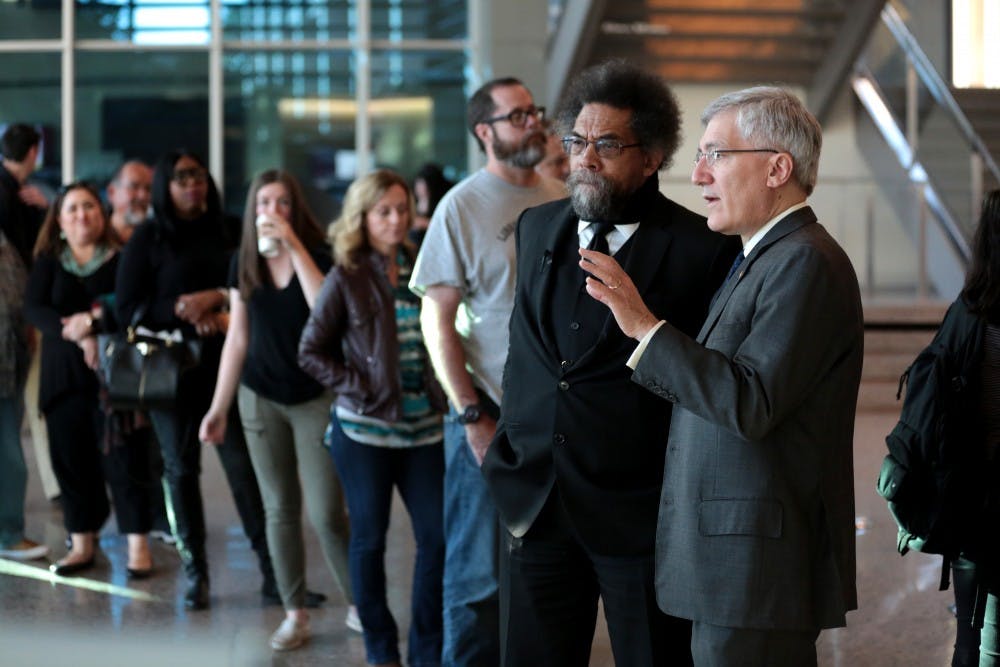Paul Carrese is director of the School of Civic and Economic Thought and Leadership at ASU.
David Marino leveled serious charges against the ASU school I direct in his State Press column. We welcome discussion about the School of Civic & Economic Thought and Leadership, but a calmer look at facts and our record suggests that his use of terms like poison, dangerous and politicizing doesn’t embody the higher discourse, and non-polemical university environment, he claims to value.
Marino did interview me for his opinion column but was more swayed by recent caricatures of our school in the New York Times and the Chronicle of Higher Education than by facts evident in our first year at ASU.
Our curriculum is more complex than any of these portraits bothers to indicate; we in fact attract students with a wide range of political and intellectual views — and Marino could have interviewed them. The school’s curriculum, as well as our new major and minor in civic and economic thought and leadership, were scrutinized for a year in ASU’s faculty governance process.
I discussed these points in my Chronicle reply to the recent caricatures, also noting that I was selected to direct this new school because I am a career academic, not a partisan. Nonetheless, my primary response to the Times, Chronicle and Marino portraits must emphasize their complete omission of SCETL’s civic education mission, and especially our 2017-18 public series on Free Speech and Intellectual Diversity.
Such glaring omissions facilitate phantasms about partisan and ideological indoctrination. In fact, thousands of people in the ASU and Phoenix communities who have attended our world-
class speaker events saw just the opposite: high-level intellectual debate, encompassing a range of views.
The school’s mission to reconnect liberal education and civic education compels us to address the polarization besetting higher education and American life by providing a forum for civil discussion in the classroom and beyond.
Yes, we have invited intellectual conservatives to speak, but we've had as many intellectual liberals speak, often in dialogue with a conservative. Look for yourself: video of all the Free Speech and Intellectual Diversity events, and our other public lectures, is on our website.
Indeed, these caricatures of our school also omit the fact that Arizona PBS — not usually considered a puppet of right-wing operatives, dark money, etc. — is recording the SCETL series as the basis for its own series on free speech in our times. Look for yourself at the episodes available in the PBS series on their website (also posted on this SCETL webpage).
Nor do any of these critics mention that our 2017-18 series is co-sponsored by ASU’s Sandra O’Connor College of Law and the Walter Cronkite School of Journalism and Mass Communication; nor is there mention of the range of professional and intellectual views among members of the series planning committee.
Our public programs reflect the spirit of our courses, and of our major and minor: to renew debate on fundamental questions and writings about moral, political, economic, and civic issues of liberal democracy, the better to navigate our 21st century world.
I should add that, while The State Press accompanied the Marino column with a picture of the Republican Party’s elephant symbol, SCETL’s only connection to elephants is our recent Global Intensive Experience course in India. We offered students a leadership and service practicum in the world’s largest liberal democracy, arisen amid civilizations beyond our own. I would be glad to tell any curious ASU students all about it, and about our next service-leadership experience in India later in 2018 — or one we’re planning for Israel and the West Bank in 2019.
SCETL develops and implements all of our challenging courses for 21st-century leaders through processes characteristic of any great university; we discuss with and persuade various faculty colleagues, committees, deans and university leaders. That’s also how we will develop our major speaker series for 2018-19 on the theme of polarization and civility, to explore the causes of our current intellectual and political dysfunctions but also ways to restore civil disagreement and reasonable compromise. We hope to attract thousands of participants once again.
A prerequisite for higher learning is civility in expressing disagreements about ideas and human affairs. A similar condition for leadership and statesmanship — especially needed in our hyper-polarized era — is fair-minded effort to consider diverse views, then seek a reasonable common ground.
Critics of SCETL’s reinvention of a traditional kind of leadership education might pause to discuss with us why Arizona’s elected leaders reasonably seek more room in higher education for inquiry about intellectual foundations of liberal democracy and America’s political and economic order, coupled with a character-centric approach to leadership and public service.
We also invite the curious and concerned to learn about our actual curriculum and programs via our very busy website, at our public events, and as visitors to our courses. We especially invite ASU students to test drive our courses, and talk with us about our major, minor, and challenging programs.
We’ve only just begun our efforts to inspire leadership and statesmanship for the common good, through an exceptional education in great works and ideas that prepares a new generation of servant-leaders — humble about human imperfection, but ready for anything.
Editor’s note: The opinions presented in this guest column are the author’s and do not imply any endorsement from The State Press or its editors. It is a response to David Marino's column "Opinion: Politicizing certain majors poisons our academic environment."
Reach Ty Fishkind, communications specialist for SCETL, at ty.fishkind@asu.edu.
Want to join the conversation? Send an email to opiniondesk.statepress@gmail.com. Keep letters under 500 words and be sure to include your university affiliation. Anonymity will not be granted.
Like The State Press on Facebook and follow @statepress on Twitter.




